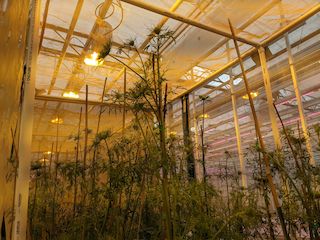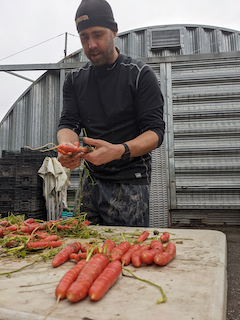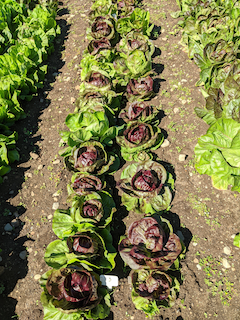Seeds
1. Carrot plants are caged and insect pollinated during the winter to make seed for summer planting. This carrot population was selected to meet BC farmers’ priorities: long storage, sweet flavor, blunt-tipped Nantes shape, and regional climatic adaptation.
2. Chris Thoreau, CANOVI Research Assistant, selects red carrots for deep red colour, uniform shape, and lack of disease. Roots will be vernalized (stored at cold temperatures to simulate winter) before greenhouse seed production. BC red carrot breeding is a collaborative effort including CANOVI, FarmFolk CityFolk, University of the Fraser Valley, and local farmers.
3. Vegetable growers participating in the CANOVI project prioritized radicchio for on-farm variety trialing in 2020 and 2021. As radicchio gains popularity among chefs and consumers, collaborative variety trialing offers growers a chance to test new varieties, share results, and build community knowledge around this crop.
Other Resources
- Beet Variety Trial 2016 Full Report (BC Seed Trials)
- Bell Pepper Variety Trial 2018 Full Report (BC Seed Trials, CANOVI)
- Corno di Toro Pepper Variety Trial 2018 Full Report (CANOVI)
- Lacinato Kale Variety Trial 2016 Full Report (BC Seed Trials)
- Leek Variety Trial 2018 Full Report (BC Seed Trials)
- Orange Carrot Variety Trial 2018 Full Report (BC Seed Trials, CANOVI)
- Orange Carrot Variety Trial 2022 Full Report (CANOVI)
- Orange Carrot Variety Trial 2022 Interactive Results (SeedLinked)
- Orange Carrot Variety Trial 2022 Summary Report (CANOVI)
- Radicchio Variety Trial 2022 Full Report (CANOVI)
- Radicchio Variety Trial 2022 Interactive Results (SeedLinked)
- Radicchio Variety Trial 2022 One-Pager (CANOVI)
- Red Carrot Variety Trial 2022 Full Report (CANOVI)
- Red Carrot Variety Trial 2022 Interactive Results (SeedLinked)
- Red Carrot Variety Trial 2022 Summary Report (CANOVI)
- Rutabaga Variety Trial 2022 Full Report (CANOVI)
- Rutabaga Variety Trial 2022 Interactive Results (SeedLinked)
- Rutabaga Variety Trial 2022 One-Pager (CANOVI)
- Spinach Variety Trial 2016 Full Report (BC Seed Trials)
- Variety Registration in Canada (Fact Sheet)



